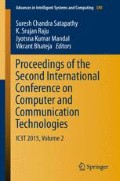Abstract
The fetal ECG is a useful tool in the assessment of condition of fetus heart before and during labor time and also contains more information than sonography. Early detection of fetal heart defect helps the selection of appropriate treatment before and during pregnancy. FECG signal obtained by non-invasive method is affected from the background noise and MECG interference as FECG signal is weak relative to MECG signal and competing noise. This interference produced by MECG signal and other artifacts can be canceled by application of adaptive filters using LMS and RLS algorithms. In this paper, we have purposed an adaptive filter algorithm which has shown better results than standard LMS algorithm for the detection of Fetus ECG Signal.
Access this chapter
Tax calculation will be finalised at checkout
Purchases are for personal use only
References
De Lathauwer, L., et al.: Fetal electrocardiogram extraction by blind source separation. IEEE Trans. Biomed. Eng. 47(5), 567–572 (2000)
Van Bemmel, J.H.: Detection of weak electro-cardiograms by autocorrelation and cross correlation envelopes. IEEE Trans. Biomed. Eng. 15, 17–23 (1968)
Callaerts, D., De Moor, B., Vandwalle, J., Sansen, W.: Comparison of SVD methods to extract the fetal ECG from coetaneous electrode signals. Med. Biol. Eng. Comput. 28, 217–224 (1990)
Rizk, M.S., et al.: Virtues and Vices of Source Separation Using Linear Independent Component Analysis for Blind Source Separation of Nonlinearly Coupled and Synchronized Fetal and Mother ECGs. IEEE EMBS, USA (2001)
Akay, M., Mulder, E.: Examining fetal heart-rate variability using matching pursuits. IEEE Eng. Med. Biol. Mag. 15(5), 64–67 (1996)
Zgallai, W.: Non-invasive fetal heartbeat detection using bispectral contour matching. In: International Conference on Electronics, Biomedical Engineering and its Application, pp. 7–8. Dubai (2012)
Agante, P.M., de Sá, J.P.M.: ECG noise filtering using wavelets with soft thresholding methods. In: Proceedings of the Computers in Cardiology’99, pp. 535–542 (1999)
Sameni, R.: Extraction of Fetal Cardiac Signals. PhD Thesis Sharif University of Technology, Tehran, Iran
Schreiber, T., Kaplan, D.: Signal separation by nonlinear projections, The fetal electrocardiogram. Phys. Rev. E 53, R4326 (1996)
Zgallai, W., et al.: Third-order cumulant signature matching technique for non-invasive fetal heart beat identification. IEEE ICASSP 5, 3781–3784. Germany (1997)
Widrow, B., et al.: Adaptive noise cancellation: principles and applications. Proc. IEEE 63(12), 1692–1716 (1975)
Kholdi, E., et al.: A new GA-Based adaptive filter for fetal ECG extraction, Word academy of science engineering and technology 54, 2011. In: Prasanth, K., et al. (ed.) Fetal ECG Extraction Using Adaptive Filters, vol. 2, issue 4 April (2013)
Larks, S.D.: Present status of fetal electrocardiography. IEEE Trans. Bio-med. Electron. 9(3), 176–180 (1962)
Drumright, T.: Adaptive Filtering. Spring, USA (1998)
Zgallai, W.: Embedded volterra for prediction of electromyographic signals during labor. In: The 16th IEEE International Conference DSP, Greece (2009)
Author information
Authors and Affiliations
Corresponding author
Editor information
Editors and Affiliations
Rights and permissions
Copyright information
© 2016 Springer India
About this paper
Cite this paper
Singh, R., Singh, A., Kaur, J. (2016). Adaptive Filter Design for Extraction of Fetus ECG Signal. In: Satapathy, S., Raju, K., Mandal, J., Bhateja, V. (eds) Proceedings of the Second International Conference on Computer and Communication Technologies. Advances in Intelligent Systems and Computing, vol 380. Springer, New Delhi. https://doi.org/10.1007/978-81-322-2523-2_10
Download citation
DOI: https://doi.org/10.1007/978-81-322-2523-2_10
Published:
Publisher Name: Springer, New Delhi
Print ISBN: 978-81-322-2522-5
Online ISBN: 978-81-322-2523-2
eBook Packages: EngineeringEngineering (R0)

